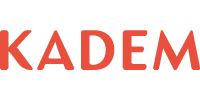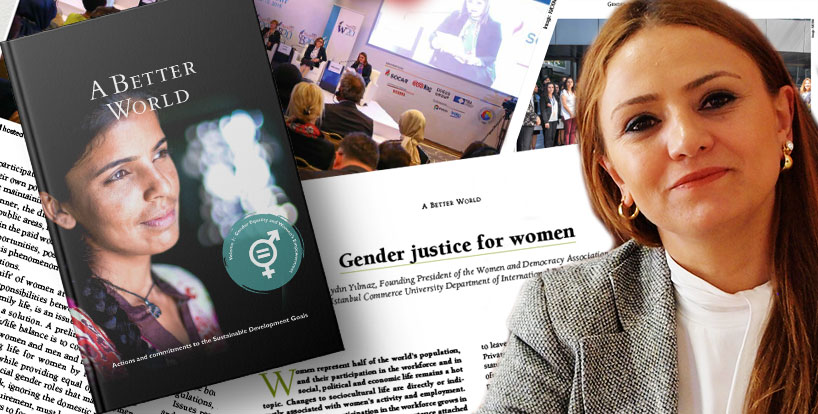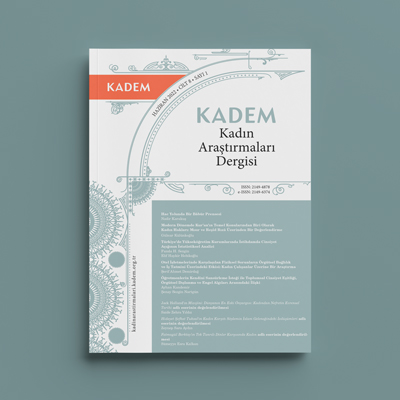Women represent half of the world’s population, and their participation in the workforce and in social, political and economic life remains a hot topic. Changes to sociocultural life are directly or indirectly associated with women’s activity and employment. Therefore, women’s participation in the workforce grows in parallel with efforts both to drive the importance attached to the female workforce and to uphold international policies and practices, education and representation.
The transformative effect of the female workforce on the global economic market has made women’s participation in the economy a prioritized area. At this point, it is important to distribute roles assigned to women and men as the two basic elements constituting society, and more specifically the family, and to establish the basic dynamics affecting such roles.
As required by democratic rights and social justice, access to economic freedom, capitalist industrialization and economic movements affecting the global economy have guided women to leave their homes and engage in different fields of activity. Private and public areas have emerged, and women still seek status and power for themselves between these areas. Women often face the dilemma of choosing between domestic and professional roles, or shouldering both burdens. Therefore, women’s dilemma must not be underestimated and practices to balance and support family life must be developed in parallel with their participation in the workforce. During the historical process, women have been regarded as cheap labour and exploited by taking advantage of their changing social, political and economic position, their secondary role as substitute labour and their participation in the workforce only to ‘contribute’ to the family budget rather than investing in it. Thus, capitalist economies alter and diversify the quality of the female workforce.
Modernism demands the highest benefit from individuals and as it is intertwined with the capitalist system today, it has become inevitable that women’s domestic work is disregarded, resulting in women being subject to gender discrimination as they participate in the workforce. In order for women to realize their own potential and to end their economic dependence while maintaining their family life as a social value in a smooth manner, the dilemmas they experience, both in the private and public areas, must be resolved. After all, women’s participation in the paid workforce is a sophisticated phenomenon. The opportunities, possibilities or difficulties brought to women by this phenomenon vary depending on the region and living conditions.
The ‘second shift’ of women at home, due to the unfair distribution of responsibilities between women and men in professional and family life, is an issue that is still discussed with efforts to find a solution. A preliminary condition in achieving a fair work/life balance is to consider the domestic responsibilities of women and men and meet the current conditions of working life for women by respecting the biological differences, while providing equal opportunities and access. The given social gender roles that make women work at home and at work, ignoring the domestic work and even referring to it as a requirement, must be reorganized. At this point, intellectual studies to form the foundation of social policies are expected to support the idea of justice.
We prioritize the concept of gender justice,1 which refers to how women must be valued in every aspect of social life while anticipating a fair distribution of roles between women and men. In fact, most statements produced about how women and men should be positioned in the family and social life, ignoring their qualitative and characteristic attributes, are not based on reality. Instead of positioning women and men as opposites, they must be regarded as the arms of a scale to establish balance; as ‘humans’ with different qualities and characters but with the same weight on the scale. It is important to avoid turning the qualities and characters of women and men into a disadvantage, and instead to create the right environment and opportunities for both to realize their full potential. Under Article 23 of the Universal Declaration of Human Rights, which stipulates “Everyone has the right to work, to free choice of employment, to just and favourable conditions of work and to protection against unemployment,” it is emphasized that women must choose their place of work freely, and just and favourable conditions of work must be provided at the workplace of their choice. However, it would not be fair to force women to choose between work and home, and it must be borne in mind that despite regularly updated social regulations, there are still failures in this regard. Issues resulting from such dilemmas between domestic and professional life are still included in the agendas of many international organizations, countries and non-governmental organizations (NGOs) with alternatives offered to make women’s lives easier. Thus, steps to be taken, policies to be produced and strategies to raise consciousness about social responsibility are highly important in terms of establishing a work/life balance. Such remedial arrangements made as part of social policies will facilitate the integration of women into working life, improving their rate of participation in public life and their visibility. In this respect, services including paid parental leave and flexible work hours are key steps not only in ensuring the continuity of women in working life, but also in protecting the ‘togetherness and sustainability of the family’. The Sustainable Development Goals clearly express that no one must be left behind. It is an essential condition for a developed society that women are integrated into economic life by establishing a balance between family life and work life. For a more fair and livable world, regulations must be more inclusive by protecting women. Supporting women’s participation in work life, especially in developing countries like Turkey, is vital for women’s access to economic freedom and their contribution to the national economy. In order to encourage women’s participation in work life and to ensure they are retained, the “affirmative action” for women which was approved in the referendum in 2010 in Turkey must be implemented.
In the global competitive environment, one condition of development for a country is to make efficient use of, and mobilize, all its resources. Therefore, ensuring women’s sufficient participation in the workforce is a priority area of policy for countries. In the Beijing Declaration and Action Plan approved at the Beijing Conference in 1995, the targets defined for the article “inequality in any type of activities for production and access to resources in economic structures and policies” include “elimination of occupational discrimination and any kind of discrimination in employment and extending aligned work and family responsibilities for women and men.” Strategic targets include not only the elimination of educational, employment and occupational discrimination, but also the alignment of family and work life for women and men. In fact, the family as the founding element of society, and access to economic needs ensuring a sustainable life, are highlighted as the greatest variables of protecting the fundamental qualities of being a society. To that end, we must protect the family and the balance between work life and family life in a just and fair manner for social welfare and sustainable development. It is very important for a sustainable order of society to defend fundamental dynamics like the family which keeps alive society and its conscientious and moral values. It is also imperative for the continuity of the family as the backbone of society to establish and safeguard the balance between the domestic and public roles of women who are included in economic life.
The importance of this issue in terms of global development was proved once again as this year’s G20 officially approved the subject of increasing women’s presence in the economy and the economic empowerment of women. During the period of Turkey’s G20 leadership from December 2014, this was brought to the agenda again since employment plans and growth strategies were among the areas considered important in supporting sustainability and development. As part of the efforts to improve social protection and working conditions, flexible working models, regulations related to maternity and breastfeeding leave, and provision of preschool and childcare services to allow women to balance their family and work life, are included in the policy areas of the Women 20 (W20) initiative group in line with the commitments adopted by G20 member countries. In addition to areas such as education, employment, leadership and entrepreneurship highlighted at the W20 National Solidarity Meeting, the article “work and life balance by developing and/or improving infrastructural mechanisms for social care (child, elderly, sick and disabled care)”, proposed by the Women and Democracy Association (KADEM) as a member of the W20 committee, became a priority area of W20 policy. The G20 remains committed to its ideal of inclusive and sustainable economic development by emphasizing inclusiveness concerning women in its final declaration, and to that end the global agenda has once again focused on improving social protection, working conditions and ensuring work/life balance from a gender justice perspective, thanks to the contributions of the W20. This initiative, launched by Turkey, will ensure continuity for women in business life and pave the way for the development of regulations and policies to protect the unity of the family if the global arena also demonstrates due attention.
Additionally, applicable and sustainable solutions for common problems of women around the world are developed to empower women and enable them to be actively involved in all areas in the elimination of gender-based injustice and inequalities at the International Women and Justice Summit held by KADEM every two years, honouring the International Day for the Elimination of Violence against Women on 25 November and hosting many ministers of state, NGOs, academics and students from around the world. The aim is to build a relevant shared wisdom in order to analyse developments regarding women’s rights and progress with respect to the human rights of women in the national and international arena. This year the main topics of the summit are Syrian refugee women and women in the peace processes. Women and children who had to flee their countries as a result of the ongoing civil war in Syria represent the most vulnerable group. Women are subject to further threats and complexities due to their gender. In this context, we must discuss policies to improve the problems and lives of refugee women from a gender justice perspective and develop specific actions and strategies for refugee women. Women play the most active role in the processes of establishing peace in situations of conflict in many countries, and they contribute to the peace process by attaching importance to the protection of justice. An in-depth analysis of women’s role and power in establishing global justice, democracy and peace is important to ensure more effective use of this power. Once again we will invite the world to follow the traces of justice for women by standing up against any kind of violence with our slogan ‘Speak Up For Justice’ on 25 November in Istanbul.
Today it is exciting that there is a serious platform for responsible action in efforts by civil societies that set the agenda. Uniting around justice, and accepting that justice represents an inclusive higher framework covering equality for women, means that many disputes centred around women are addressed using a scale of conscientious and social responsibility. Justice for women can be understood as a conscientious responsibility only if civil society and governments come to terms by taking solid steps.
Consequently, civil societies must take action to guide and raise awareness of society by leveraging the facilities of democracy, and act to fulfil their own conscientious responsibility without getting stuck in certain models. Civil society functions by discussing many problematic questions concerning the government, economy and family and delivering a shared consciousness as a result of such discussions. Accordingly, the International Women and Justice Summit is an attempt by civil society to come together, fulfil its conscientious responsibility and reach out to the world.




